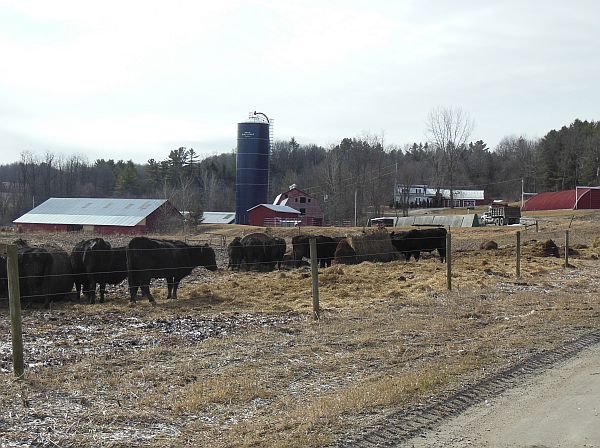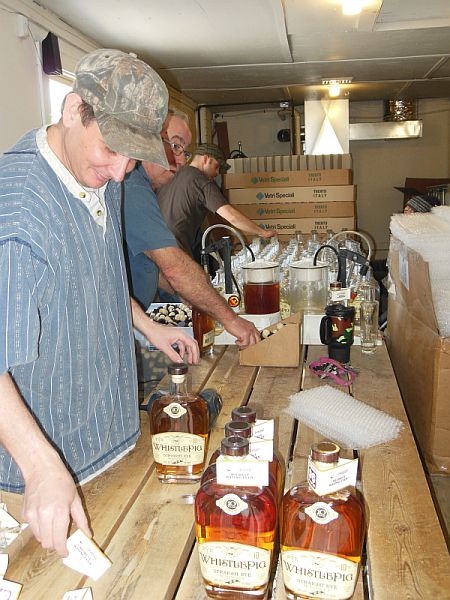
When an old dairy farm in Shoreham became the hub for a trendy new whiskey company several years ago, many were excited by the idea of new jobs and economic development.
But two things may get in the company’s way – mold and the state’s definition of a farm.
WhistlePig is nestled on 500 rolling acres in Shoreham. Driving by, the place looks a lot like a farm. It has a big blue silo, a couple of barns and some animals.
But according to state officials, Raj Peter Bhakta’s whiskey business is not a real farm – at least not yet – and it may never be.
Zach Withers is one of about a dozen full and part time employees who work for WhistlePig.
"We plan to make whiskey here from the rye that we grow here on the farm," he said. "Right now we have 240 acres and another 440 tillable acres under contract. And, you know, this is craft distillation."
 Right now, the company imports its whiskey from Canada and just bottles it in Vermont. But the plan is to distill home grown rye right on the farm.
Right now, the company imports its whiskey from Canada and just bottles it in Vermont. But the plan is to distill home grown rye right on the farm.
But here’s the rub. Would that plan qualify WhistlePig as a farm that would be exempt from Act 250 and other development controls?
Or would it be a business subject to stricter regulation?
The state says it’s a business and Act 250 applies. WhistlePig and some farmers disagree and say it’s clearly a farm. But WhistlePig is covering its bets. While it asks the state Environmental Court to settle the question, it’s also seeking Act 250 permits. Hearings start this week.
Meanwhile, Canadian-distilled whiskey sits in this barn. Withers walks in where close to 400 barrels are stacked in rows.
"Now whiskey is a product of age. The wood gives it it’s flavor," Wither said. "And what makes ours so special is we do about seven years in new oak barrels, then we switch it into barrels that had bourbon in it. It gives it a sweeter finish and makes it a very palatable drink."
Consumers seem to agree. In two years, the quirky named rye has become the darling of the whiskey tasting circuit with nearly a half million dollars worth of sales in Vermont alone.
At the nearby Whiting Country Store, Elwood Martin of Salisbury says even if he can’t afford WhistlePig’s $80-a bottle price tag, he thinks the company is good for the area.
"I think it’s great," Martin said. "Anything in Vermont, especially in the rural areas – if we can get some work created – right now I know friends of mine who are working there who would not be working if that job wasn’t there. That’s huge."
The company will likely do even more hiring if it wins Act 250 approval to build a distillery and a 30-thousand barrel warehouse.
But WhistlePig’s expansion plans have some neighbors worried.

George Gross and his wife, Barbara Wilson, own Solar Haven Farm, which is an organic berry and fruit farm in Shoreham.
The couple say they and a nearby maple syrup producer are very concerned about baudonia compniacensis. That’s the the Latin name for a sooty black mold that flourishes in moist areas with high amounts of ethanol the gas given off by whiskey as it ages.
"So we have pictures in here documenting what the mold looks like on structures," Gross said as he paged through photos. "These are from the Louisville, Kentucky, area near Jim Beam distillery."
WhistlePig’s owner Raj Peter Bhakta has repeatedly said mold won’t be a problem because of the size of his operation.
But William McMurry, a Kentucky attorney hired by Gross and Wilson says he doesn’t buy that. McMurry is spearheading black mold lawsuits against five of the largest whiskey distilleries in the country
"Any company that wants to run a business with 30-thousand barrels in ten years is going to want to run a business with 300-thousand. I mean come on, look at the growth of the industry – any fool can see this industry is exploding."
But Bhakta bristles at that and says making a high quality ten-year-old rye whiskey is not something he can or wants to mass-produce.
"We’re a very, very small company," Bhakta said. "Of course we wish to grow. That’s the story of America. So what’s happened here is this NIMBY neighbor is using this bugaboo – because that’s all it is, a bugaboo – a specter of fungus growth as some reason to stop me."
But air quality experts say ethanol emissions are not trivial. Brandy makers in California, for example, where air quality standards are more strictly regulated, have had to install technology to capture and oxidize their ethanol emissions. William McMurry is pushing hard with his lawsuits to force whiskey makers in Kentucky and the United Kingdom to install similar systems.
How the issue will be handled in Vermont will be closely watched during WhistlePig’s Act 250 hearings.